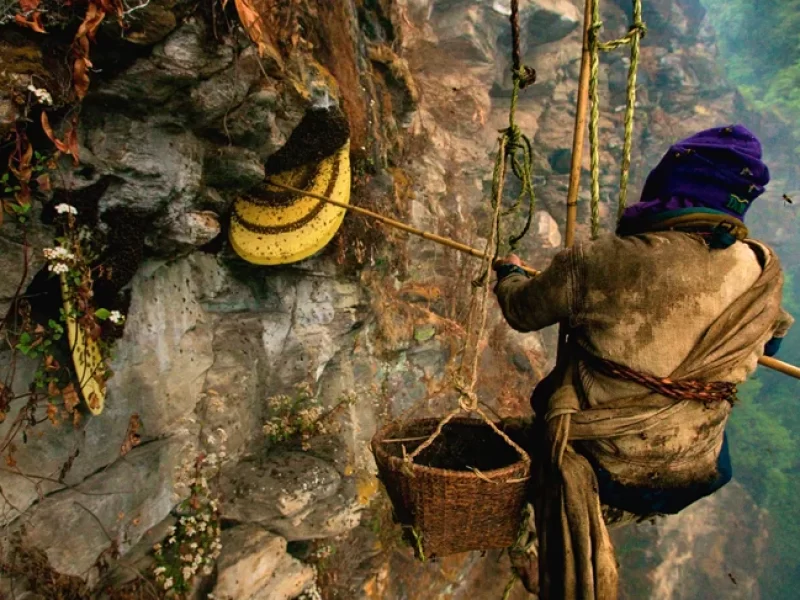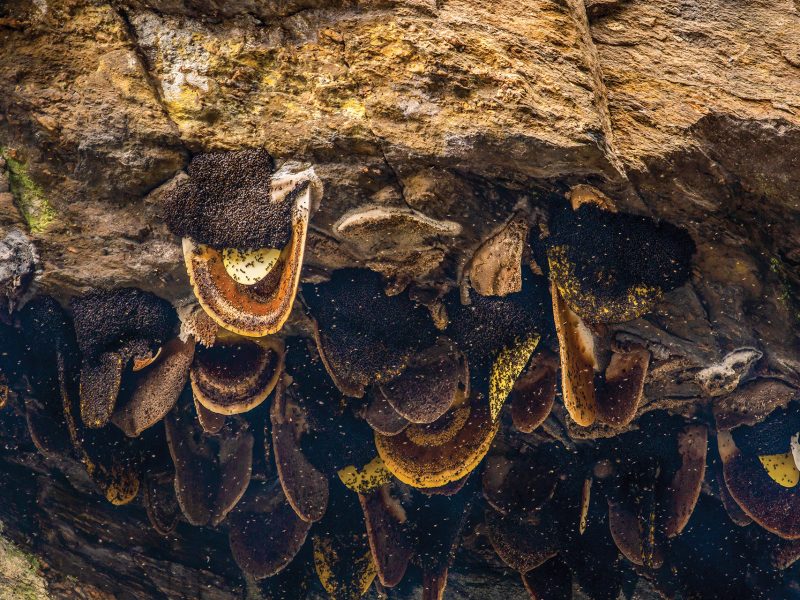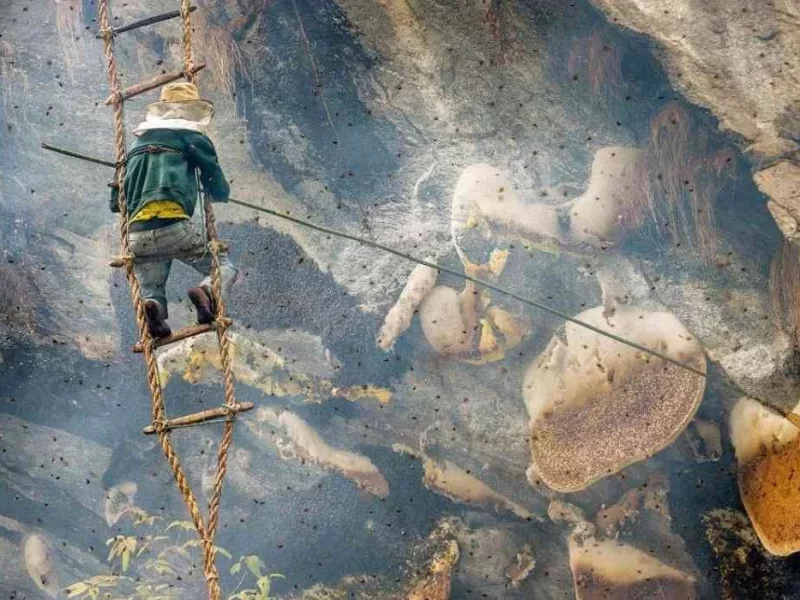Honey hunting is also known as honey harvesting or wild honey gathering. It is the practice of harvesting honey from wild bee colonies. It’s an ancient tradition practiced by various indigenous communities around the world, particularly in regions where wild honey bees thrive.
It is not only a means of obtaining honey but also a cultural tradition deeply intertwined with the identities and livelihoods of many indigenous communities. However, it’s also a dangerous activity due to the risks involved in climbing and dealing with wild bees.
Honey hunting in Nepal is a traditional practice deeply rooted in the cultural and spiritual texture of the country. It serves as a demonstration of the harmonious relationship between humans and nature, highlighting the interconnectedness of culture, spirituality, and biodiversity in this Himalayan nation.
What’s the Cultural & Spiritual Significance Of Honey Hunting In Nepal?
Honey hunting is really important in Nepal because it’s been part of their culture for a long time. Here are the key points about the spiritual and cultural significance of honey harvesting in Nepal. They are:
- Honey harvesting is passed down through generations. It reflects the rich cultural pattern of Nepal.
- It shows harmony with nature and emphasizes respect for the environment.
- It represents bravery, teamwork, and resilience. Its traits are highly valued in Nepalese society.
- It brings villages together and strengthens social bonds and solidarity.
- It provides food and income. It also contributes to the livelihoods of local residents.
- Its stories and legends enrich its significance. It often conveys moral lessons and celebrates courage.
- It is seen as a sacred activity. During the harvest, people often perform rituals and ceremonies to ask for blessings from gods and spirits, hoping for a successful hunt and lots of honey
- It represents a deep cultural and spiritual heritage. It shows the complex relationship between humans and nature. Lastly, it also reminds of the long-lasting traditions shaping Nepalese identity.
Overall, honey hunting is a big part of Nepalese life. It shows how people and nature can live together and reminds everyone of their traditions and culture.
Traditional Methods Of Honey Hunting In Nepal

In Nepal, people have a traditional way of hunting for honey which has been passed down for a long time. Here’s the process of honey gathering how they do it:
- Finding the Honey: First, they search for where wild bees have made their hives. These could be in high places like cliffs or trees.
- Getting Ready: Before they climb up to the hives, they prepare special tools like ropes and ladders to help them. They also use smoke to calm the bees down.
- Climbing Up: Thirdly, they climb up to where the hives are which can be quite high and dangerous.
- Collecting the Honey: When they’re close to the hives, they use smoke to keep the bees calm. Then, they carefully take out the honeycomb without hurting the bees or damaging the hive.
- Bringing Down the Honey: Once they’ve collected the honeycomb, they bring it down safely.
- Using the Honey: Lastly, the honey they collect is used for eating or selling.
In this way, honey is haunted in Nepal. This traditional way of honey hunting shows how people in Nepal have a special connection with nature and how they’ve learned to work with it over many years.
Top 5 Honey Hunting Destinations In Nepal
Nepal’s top honey hunting destinations offer a blend of adventure and cultural immersion. From the majestic Annapurna region to the rugged wilderness of Dolpa each destination showcases traditional honey harvesting practices amidst stunning landscapes. Kaski, Lamjung, Gorkha and Dolpa districts provide unique experiences reflecting Nepal’s rich cultural heritage.
The top 5 honey gathering destinations in Nepal are listed and explained below:
1. Annapurna Region
The Annapurna Region is famous for its breathtaking scenery. Here, amidst lush forests and villages, honey hunting is a popular activity. People are drawn to this area for its stunning views, making it a favorite destination for those seeking both adventure and natural beauty.
2. Kaski District
Kaski District is situated in the heart of Nepal, is famous for its traditional honey harvesting practices. This central location draws both locals and tourists seeking authentic cultural experiences. The district’s renowned honey gathering traditions offer visitors a unique opportunity to witness age-old customs amidst the stunning landscapes of Nepal.
3. Lamjung District
Lamjung District is known for its diverse plants and animals making it a haven for nature lovers. You can go honey harvesting while enjoying stunning views of the Himalayas. Its breathtaking natural beauty has made it famous among travelers seeking an adventure amidst the wonders of Nepal’s landscape.
4. Gorkha District
Gorkha District lies in the foothills of the Himalayas, tucked away in the mountains. Old honey hunting customs are kept alive offering a glimpse into ancient traditions. Exploring this district not only allows you to experience honey gathering but also provides valuable insights into Nepal’s rich cultural heritage.

5. Dolpa District
Dolpa District is famous for its remote and rugged landscape, making it a challenging yet exciting destination for honey gathering. Visitors can experience a one-of-a-kind honey-hunting adventure amidst untouched wilderness. Moreover, Dolpa is renowned for its traditional Tibetan culture, adding a unique cultural dimension to the honey-hunting experience.
These are the top 5 destinations for honey harvesting. This destination provides a unique perspective on honey hunting reflecting the diverse landscapes and cultural texture of Nepal.
Tips For Tourists Participating In Honey Hunting Expeditions
Tourists participating in honey gathering expeditions should prepare well and be mindful of the environment and cultural practices. Here are some tips:
- Safety First: Ensure you have proper safety gear, including gloves and protective clothing to minimize the risk of bee stings and injuries.
- Follow Instructions: Listen to the instructions of experienced honey hunters and local guides and follow their lead during the expedition.
- Respect the Environment: Stay on designated paths and avoid disturbing wildlife or damaging the natural habitat during the hunt.
- Cultural Sensitivity: Respect local customs and traditions surrounding honey hunting and participate with reverence and appreciation for the cultural significance of the activity.
- Stay Hydrated and Energized: Bring plenty of water and snacks to stay hydrated and energized during the expedition as honey harvesting can be physically demanding.
- Stay Calm Around Bees: Avoid making sudden movements around bees to minimize the risk of agitation and stings.
- Capture Memories Responsibly: Take photographs and videos to capture your honey-hunting experience, but do so respectfully without disrupting the activity or the environment.
- Support Local Communities: Purchase locally-made honey and other products to support the livelihoods of the communities you visit and contribute to sustainable tourism.
- Leave No Trace: Dispose of waste properly and leave the environment as you found it, minimizing your impact on the natural surroundings.
- Enjoy the Experience: Adopt the adventure and cultural immersion that honey gathering offers and cherish the memories of this unique and meaningful experience in Nepal.
Managing Risks And Benefits In Honey Hunting
Managing risks in honey hunting involves several important steps to ensure the safety of hunters. You can manage risk by securing safety. Wear protective gear like gloves and clothes and get proper training. Check the topography and weather, communicate with others and inspect equipment. Be cautious of bee stings and allergies and have an emergency plan ready. Respecting bees and being careful keeps everyone safe. By following these measures, honey hunters can effectively manage risks and enjoy a safer hunting experience.

Here are some benefits of honey gathering. They are listed below:
- Source of Nutrition: Honey is a natural sweetener rich in nutrients like vitamins, minerals and antioxidants, providing energy and promoting overall health.
- Economic Opportunity: Itcan serve as a source of income for local communities through the sale of honey and related products, contributing to livelihoods and economic development.
- Cultural Preservation: It preserves traditional knowledge and practices passed down through generations maintaining cultural identity and heritage.
- Ecological Balance: It promotes the conservation of bee populations and their habitats, which are essential for pollination and maintaining biodiversity.
- Adventure and Tourism: It attracts tourists and adventurers offering unique experiences and promoting eco-tourism initiatives in rural areas.
- Health Benefits: Besides its nutritional value, honey has various health benefits such as soothing sore throats, healing wounds and supporting digestive health.
Overall, honey hunting provides a range of benefits from supporting local economies and preserving cultural traditions to promoting environmental conservation and also offering healthful products for consumption.
Preserving Nepal’s Honey Hunting Heritage
Nepal’s honey-hunting heritage is actively preserved through various means. Families play a crucial role by passing down honey-hunting skills to younger generations, ensuring the tradition continues.
Additionally, communities come together to celebrate honey harvesting through festivals and events, highlighting its significance in Nepalese culture. Efforts are also made to protect bee populations and their habitats, safeguarding the practice for future generations. Elders share their knowledge of honey-hunting techniques and the importance of respecting nature with the youth ensuring the tradition thrives.
Moreover, honey gathering is promoted as a source of cultural pride contributing to Nepal’s identity. Eco-tourism initiatives further support local communities by educating visitors about honey harvesting and its cultural significance. Ultimately, by preserving honey harvesting, Nepal maintains its rich cultural heritage and ancient wisdom.
Conservation Efforts On Honey Hunting
The conservation efforts aim to balance the cultural significance of honey harvesting with the need to protect bee populations and their habitats for the future. Here are the conservation efforts on honey harvesting presented in points:
- Preserving natural areas where bees live and ensuring they have enough food and shelter.
- Promoting methods that don’t harm bee colonies, ensuring honey gathering can continue without endangering bee populations.
- Teaching communities about responsible beekeeping and the importance of preserving bee habitats.
- Restoring damaged habitats to create healthy environments for bees.
- Implementing rules to manage honey gathering sustainably like limits on harvesting and monitoring to ensure compliance.
- Engaging local communities in conservation efforts empowering them to take action to protect bees and their habitats.
- Spreading awareness about the importance of bees and honey harvesting encourages people to support conservation efforts.
Conclusion
In conclusion, honey hunting holds a significant place in Nepal’s cultural heritage offering both economic opportunities and ecological benefits. While the tradition faces risks, conservation efforts aim to preserve it for future generations. By balancing cultural pride with environmental stewardship, Nepal ensures the enduring legacy of honey hunting while safeguarding its natural resources.
Frequently Asked Questions (FAQs)
1. Is honey hunting dangerous?
Yes, honey hunting can be dangerous due to risks like climbing heights and dealing with wild bees. Proper safety measures are crucial to minimize risks.
2. Why is honey hunting important in Nepal?
Many communities in Nepal actively engage in honey harvesting as it deeply ingrained cultural tradition, providing them with food, income, and cultural identity.
3. How does honey hunting benefit the environment?
Honey gathering benefits the environment by promoting bee conservation, maintaining ecological balance and preserving biodiversity in natural habitats.
4. Can anyone do honey hunting?
While honey hunting requires skills and knowledge, anyone can learn with proper training and guidance from experienced hunters.
5. How can I support honey hunting conservation efforts?
You can support honey hunting conservation efforts by raising awareness, practicing responsible beekeeping and supporting eco-tourism initiatives that promote sustainable honey hunting practices.

Comment (0)